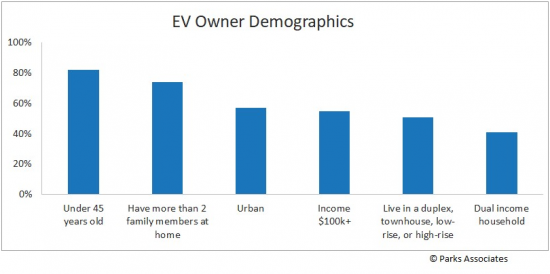 |
市場調查報告書
商品編碼
1107252
電動汽車和智能家居Electric Vehicles and the Smart Home |
||||||
總結
隨著世界各國政府、主要汽車製造商和大型科技公司都投資於電動汽車,該市場正在增長。本報告考察了電動汽車的普及率,包括電動汽車車主的充電和使用習慣、非車主的購買意向以及購買障礙。它還分析了消費者對聯網汽車的興趣以及將電動汽車用作儲能設備的情況。

分析師意見
“未來幾年,能源和互聯技術行業的公司將確定電動汽車的崛起將如何影響其各自的行業和客戶群,並使他們的解決方案成為新現實的一部分。”它制定成為一個部門的戰略將是一個艱難但關鍵的時刻。”- Chris White,Parks Associates 高級分析師
內容
執行摘要
- 電動汽車認知度高
- 電動車車主人口統計
- 電動車車主體驗
- 按地點劃分的每月電動汽車充電次數
- 技術親和力與對電動汽車的興趣之間的相關性
- 電動汽車和智能家居應用的大跨界
- 家居節能改造
- 使用電力公司提供的特殊能源計劃
- 協調或允許電力公司將電動汽車充電延遲至高峰時段結束
電動汽車進入汽車市場
- 擁有的車輛類型
- 插電式電動汽車的所有權
- 按車輛類型劃分的車輛擁有量
- 未來 12 個月內購買汽車的可能性
- 車輛購買申請人的購買流程
- 非車主購買電動汽車的意願很高
- 未來購買電動汽車的可能性
- 所有購車者中最有可能的類型(2021 年第四季度)
- 購買意向 按車型劃分的電動汽車購買意向
EV 概述和特點
- 對電動汽車的高度認可
- 通過所有權/購買意圖了解電動汽車
- 活躍的汽車購買者對電動汽車的認知度很高
- 對獨特電動汽車技術的研究量
- 未來各車型對電動汽車的認知度較高
- 按人口統計因素劃分的電動汽車認知度高
- 按性別劃分的電動汽車認知度
- 不同種族的電動汽車認知度
- 非電動車車主對電動汽車的態度
EV 價值主張
- 了解電動汽車的優勢
- 當今先進電動汽車功能的價值
- 正在開發的電動汽車功能的價值
- 對電動汽車“互聯”功能的認可
- 電動汽車的價值——“互聯”汽車技術
當前的 EV 車主
- 按人口和住房因素劃分的電動汽車擁有率
- 有孩子的家庭擁有的車輛
- 家庭規模擁有的車輛
- 介紹部分擁有的車輛
- 電動汽車車主的智能家居設備擁有率
- 安全系統的電動汽車所有權
- 電動車車主的節能行為細分
- 電動汽車車主家庭能源設備擁有率
電動車車主的經驗和觀點
- 電動車車主體驗:淨推薦值
- 在 EV 中執行駕駛任務的頻率
- 電動車車主面臨的問題:期望與現實
- 電動汽車車主對能源計劃的認識
- 電動汽車車主的能源計劃使用
- 以前用於電動汽車車主的能源計劃
- EV專項項目信息來源頻道
- 經銷商在購買時提供的優先主題
充電體驗與趨勢
- 電動汽車充電頻率:同比
- 電動汽車長期充電頻率
- 電動汽車充電頻率:按地點
- 電動汽車的優先充電地點
了解冷漠:購買獎勵和抑制
- 為不擁有或計劃擁有電動汽車的消費者提供購買獎勵
- 電動汽車購買激勵量化:充電站普及
- 量化電動汽車購買激勵措施:減稅
- 量化購買電動汽車的激勵措施:按收入減稅
- 量化電動汽車購買激勵措施:每月節省燃料
- 阻礙購買電動汽車的因素
- 按種族/民族劃分的阻礙購買電動汽車的因素
- 按性別劃分的阻礙購買電動汽車的因素
- 按收入劃分的抑制購買電動汽車的因素
- 阻礙有孩子的家庭購買電動汽車的因素
- 按節能行為細分抑制購買電動汽車的因素
- 按居住地區劃分的阻礙購買電動汽車的因素
購買者:可能購買電動汽車的消費者
- 希望購買電動汽車的人擁有的車輛
- V 按自有車輛類型劃分的購買意向
- 電動汽車車主和潛在買家之間的技術親和力
- 智能家居和安全系統的所有權
- 協調或允許電力公司將電動汽車充電延遲至高峰時段結束
- 家居節能改造
- 按人口統計和住房因素劃分的電動汽車車主和潛在購買者細分
電動汽車愛好者想要的汽車類型
- 潛在買家偏愛的車輛類型(按收入)
- 電動汽車車主有購買意向的車輛和購買意向細分市場
- 希望購買電動汽車的有孩子的家庭首選的車輛
- 按小區購買意向車型
附錄
SYNOPSIS:
With governments around the globe, major car makers, and big tech all investing in electric vehicles, the market is primed for growth. This research measures adoption of EVs, including the charging and usage habits of owners, purchase intention for non-owners, and examines the barriers to buying. It also analyzes consumer interest in utilizing their EV as a connected car and as an energy storage device.

ANALYST INSIGHT:
"The next few years represent a challenging but critical time for players in energy and connected technology industries to determine how the rise of EVs will impact their industries and customer segments, and strategies to ensure their solutions will be part of the new reality." - Chris White, Senior Analyst, Parks Associates.
Table of Contents
Executive Summary
- High Familiarity with Electric Vehicles
- EV Owner Demographics
- EV Owner Experience
- Monthly EV Charging Frequency by Type of Location
- Tech Affinity Correlates with of EV Interest
- Major Crossover Between EV and Smart Home Adoption
- Modified Their Home for Energy Savings
- Use Special Energy Programs Offered by Electricity Provider
- Willingness to Adjust or Allow Utility to Delay EV Charging Until After Peak Periods
EVs Entering the Vehicle Market
- Type of Vehicle Owned
- Ownership of Plug-in Electric Vehicle
- Vehicle Ownership by Types
- Likelihood of Purchasing a Vehicle in Next 12 Months
- Vehicle Intenders' Shopping Process
- High Intention of Purchasing EV Among Non-Owners
- Likelihood of Purchasing EV in the Future
- Most Likely Type Among All Vehicle Intenders (Q4/2021)
- EV Purchase Intention by Type of Vehicle Intend to Buy
Overall Perceptions of EVs and their Features
- High Familiarity with Electric Vehicles
- Familiarity with EVs by Car Ownership & Purchase Intention
- High Familiarity with EVs by Active Vehicle Shoppers
- Quantity of Research of Electric Vehicles Unique Technology
- High EV Familiarity by Type of Future Vehicle
- High Familiarity with EV by Demographic Factors
- EV Familiarity by Gender
- EV Familiarity by Ethnic Heritage
- Attitudes Toward Electric Vehicles Among Non-EV Owners
The Value Proposition of EVs
- Familiarity with Electric Vehicle Benefits
- Value of Advanced EV Features Today
- Value of EV Features in Development
- Familiarity with Electric Vehicles "Connected" Features
- Valuable Features of Electric Vehicles - "Connected" Car Tech
Today's EV Owners
- EV Ownership by Demographic and Housing Factors
- Type of Vehicle Owned by Children at Home
- Type of Vehicle Owned by Household Size
- Type of Vehicle Owned by Adoption Segment
- Smart Home Device Ownership by EV Ownership
- Security System Ownership by EV Ownership
- Energy Saving Actions Segments by EV Ownership
- Home Energy Equipment Ownership by EV Ownership
EV Owner Experiences and Perspectives
- EV Owner Experience: Net Promoter Score
- Frequency of Performing Driving Tasks with an EV
- EV Ownership Pain Points: Expectations vs. Reality
- Energy Program Familiarity by EV Ownership
- Energy Program Use by EV Ownership
- Previously Used Energy Program by EV Ownership
- Information Source Channel of EV Special Plan
- Preferred Topic Provided by Dealers During Purchase
Charging Experiences and Preferences
- Frequency of Charging Electric Vehicles, YoY
- Electric Vehicles Long Time Charging Frequency
- Electric Vehicles Charging Frequency by Locations
- Preferred Charging Location of Electric Vehicles
Understanding the Disinterested: Purchase Incentives and Inhibitors
- Purchase Incentives for Consumers Who Do Not Own Or Intend To Own an EV
- Quantifying EV Purchase Incentives: Widespread Availability of Charging Stations
- Quantifying EV Purchase Incentives: Tax Break
- Quantifying EV Purchase Incentives: Tax Break by Income
- Quantifying EV Purchase Incentives: Monthly Fuel Savings
- Electric Vehicle Purchase Inhibitors
- Electric Vehicle Purchase Inhibitors by Race or Ethnicity
- Electric Vehicle Purchase Inhibitors by Gender
- Electric Vehicle Purchase Inhibitors by Income
- Electric Vehicle Purchase Inhibitors by Children at Home
- Electric Vehicle Purchase Inhibitors by Energy Saving Action Segments
- Electric Vehicle Purchase Inhibitors by Residency Area
Intenders: Consumers Likely to Buy an EV
- Type of Vehicle Owned Among EV Intenders
- EV Purchase Intention by Type of Vehicle Owned
- Tech Affinity Among EV Owner & Intender Segments
- Smart Home and Security System Ownership
- Willingness to Adjust or Allow Utility to Delay EV Charging Until After Peak Periods
- Modified Their Home for Energy Savings
- EV Owner & Intender Segment by Demographic and Housing Factors
The Types of Vehicles EV-intenders Want
- Type of Vehicle Preferred by EV Intenders Grouped by Income
- Type of Car Intend to Buy by EV Owner & Intender Segment
- Type of Vehicle Preferred by EV Intenders Grouped by Children at Home
- Type of Car Intend to Buy by Residency Area













